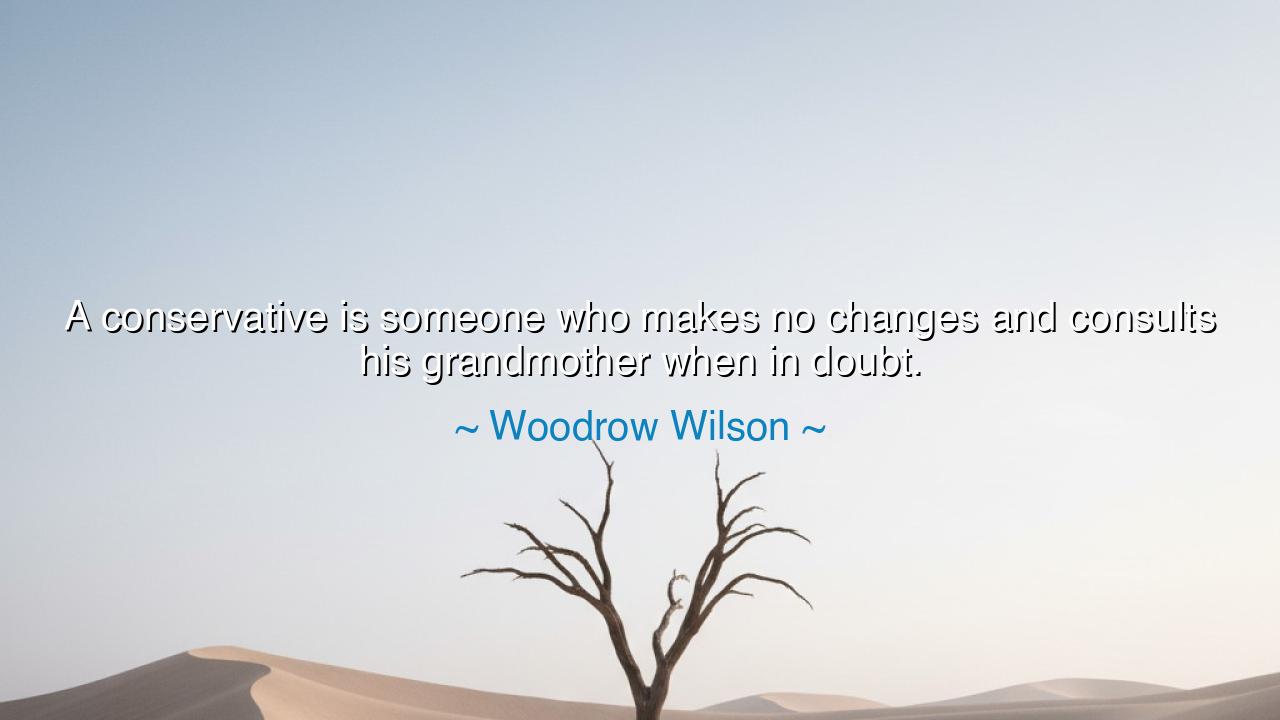
A conservative is someone who makes no changes and consults his
A conservative is someone who makes no changes and consults his grandmother when in doubt.






The words of Woodrow Wilson — “A conservative is someone who makes no changes and consults his grandmother when in doubt.” — are spoken with wit, but beneath the jest lies a piercing critique of rigid caution. Wilson, the scholar-president who led America through the First World War, knew well the forces of tradition and innovation that clashed in politics. With this remark, he paints the conservative as one bound to the past, seeking guidance not from vision of the future but from the voices of ancestry and custom.
The meaning is sharp: the conservative, in Wilson’s view, clings to what is old and familiar, avoiding change even when it is necessary for growth. To “consult his grandmother” is to defer to the wisdom of generations past, but also to reveal a fear of progress, a reliance on what is safe rather than what is bold. Wilson contrasts this spirit with his own belief in reform and progressivism, where society must adapt and evolve to meet the challenges of its age.
History provides fertile ground for this insight. In the early 20th century, America wrestled with the forces of industrialization, immigration, and social reform. Wilson himself championed progressive policies such as the Federal Reserve System and antitrust measures, arguing that old ways of governing could not meet the needs of a modern world. His remark about conservatives reflects this struggle: those who resisted reform clung to outdated remedies, unable or unwilling to move forward.
Yet his words also carry irony, for the wisdom of the grandmother is not without value. Tradition preserves lessons, and the past can guide the future. But Wilson’s warning is that reverence for the past must not become paralysis in the present. To worship tradition without discernment is to freeze a nation in time, unable to rise to new demands. A balance must be found, where ancestral wisdom informs but does not imprison.
Let this wisdom be handed down: the world is ever-changing, and those who would lead must not fear change, but harness it. To consult the grandmother is honorable, but to refuse to step beyond her counsel is folly. Wilson’s words, light with humor yet heavy with meaning, remind us that a people who cling only to the past cannot embrace the promise of the future. The path of progress demands courage — courage to honor the old, but to walk boldly into the new.






TDDoan Trung Dong
This is an interesting perspective, but I wonder if it's too reductive. I get the sense that Wilson is suggesting that conservatives are stuck in the past, but isn’t the role of a conservative to value stability and the wisdom of those who came before us? By framing conservatism in such a narrow way, does the quote dismiss the possibility that conservative thought can evolve? Can a conservative still make thoughtful, progressive decisions while respecting tradition?
PANguyen Phuong Anh
Wilson’s quote seems to poke fun at conservatives, but could it be a more profound critique of human nature in general? Are we all guilty of relying on past experiences or wisdom when uncertain about the future? I think what Wilson may be highlighting is the natural inclination to hold onto what’s familiar, but does this make someone ‘conservative,’ or is it just a human instinct? It would be interesting to explore whether progressives do the same in their own way.
SPSon Pham
I’m not sure if I completely agree with this characterization of conservatism. Yes, there’s an element of holding on to traditional values, but is it really as limiting as Wilson suggests? Maybe the quote highlights the idea that conservative thought is less about change and more about maintaining stability. Should we view this as a flaw or just as a different approach to societal progression?
TATo Tram Anh
This quote feels a bit tongue-in-cheek, but there might be some truth to it. The idea of not making changes and consulting an elder when unsure suggests that conservatism might be about preserving what’s familiar and safe. But is it fair to stereotype all conservatives this way? I think every political ideology has its version of looking to the past or tradition, but does it make conservatives less adaptable in the modern world?
VPVy Pham
I find this quote amusing but also thought-provoking. Is it suggesting that conservative values are inherently backward-looking? The idea of consulting a grandmother seems to imply a reliance on tradition, but isn’t tradition important in any belief system? Could it be that Wilson is critiquing conservatives for holding on to the past too tightly? Or is he making a more subtle point about the importance of balancing tradition with progress?